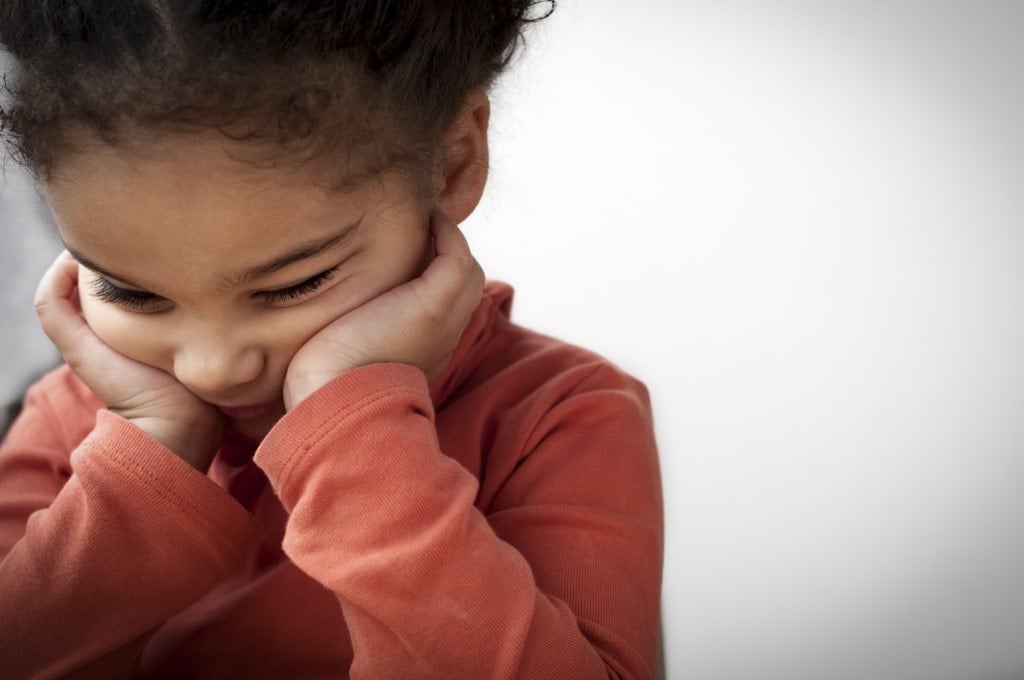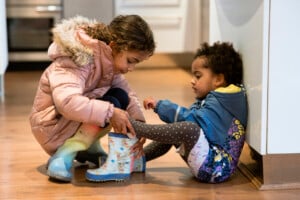“It’s just like riding a bike!” We hear this phrase often, and it insinuates that learning is lifelong. Once you learn something, it’s locked in. It becomes a skill or store of knowledge we can always access. In adults, this is mostly true; learning is a linear and sequential process. We start with no knowledge or skills in a particular area, then do some training/reading/practice, and then, ta-dah! We have learned a new shiny skill. However, in children, learning and development occur slightly differently. Learning occurs in stops and starts, and not all skills or knowledge are retained; sometimes, skills regress. And while some child regression may indicate a bigger problem, most of the time, it is simply a response to stress. But, as parents, it can be hard to know how to respond.
Regression in Children: When Development Seems to Go Backwards
So, what does regression mean exactly?
In child development terms, the term “regression” means the loss of skills recently acquired or even moving a step (or more) backward in terms of development.8 For example, we may often see children who had previously been toilet trained suddenly wetting or soiling again. Or a school-aged child suddenly wanting to be babied, babbling, sucking their thumb, wanting to be held or rocked like a much younger child.
Regressed behaviors can leave parents with lots of big feelings, like frustration at having to backtrack or re-teach skills (particularly if they had been challenging to grasp in the first place). But caregivers can simultaneously worry. They wonder if something is wrong with their child and may be concerned about their well-being or development. I’ll say this not to worry you but to be clear that regression needs to be checked out in some cases. As a parent, you know best, but an assessment with your doctor or pediatrician to put your mind at ease will not cause any harm. Many issues (including temporary ones) are best treated with early intervention. However, in most cases, regression is not harmful in the long term and resolves on its own or once circumstances/life events around the child change.
So why does regression occur, and what can you do about it?
Well, let’s get to the “why” first. Regression most frequently occurs in response to a significant change in your child’s environment, including things like starting school, a change in caregiver, a new sibling, or an illness. It can even be triggered by things occurring in a parent or loved one’s life, such as marital conflict, separation, stress, changes in working conditions, etc. Even if a change is positive or exciting, a regression can occur. Regression is frequently experienced in conjunction with events or situations when your child is stressed, sometimes in relation to a change (examples above) or a single overwhelming incident, like a car crash, a death, etc.
It can also occur during peak developmental periods when your child learns many new things. So much learning is happening that the recent skills are almost pushed to the side to make way for new learning. Skills are essentially memories; if our memories aren’t encoded correctly, we can forget them. Very (very) simply put, encoding involves moving something from short to long-term memory with repetition. So, if they are learning lots of new things, their brain might be unable to properly retain the recently learned skills while practicing or taking in new things. However, as our children are like sponges in their early years, they will quickly re-learn or regain these skills. You might not even recognize these small regressions as general learning is so rapid at certain stages in your young child’s life.
So why is stress such a big deal in relation to regression?
When our bodies are stressed, certain hormones are released: cortisol and adrenalin. These hormones are adaptive because they make our hearts beat faster and we breathe more quickly. This ultimately means oxygen is pumped more quickly around the body, and energy stores are accessed so our muscles can work hard to keep us free from danger. This process is often called “fight, flight, and freeze.” Our body needs these hormones to protect themselves from danger. Have you ever heard of those mama and papa bears who lift cars off their children to save them? Yep, it’s thanks to cortisol and adrenalin. These hormones have a pretty big impact on the part of our brain (the amygdala, if you want to get scientific), which is the “alarm” system in the brain.
So, we are more reactive, anxious, and frightened because we are primed to look out for danger. The emotional center of the brain is also impacted, so it’s harder to regulate emotions (cue meltdowns and tantrums . . . in adults and kids). But finally, those stress hormones also impact memory storage and encoding. In terms of regression, all of these things mean our kids will be overwhelmed, making it hard to retain memories/skills. Or, to feel safe, they might revert to an earlier stage of development where they feel secure and stable.
Gee, that stress stuff sounds serious . . . so how can we help our kids?
I’m glad you asked! There are several ways you can help your kiddos cope with the stress that can trigger regression.
Name the Emotion
Try to identify the emotion underpinning the behavior and name it for your child. This helps them understand what is occurring, and when our kids understand their emotions, they feel less scared and more confident to manage (because they know what emotion they are dealing with). For example, “I’ve noticed that since you changed schools, you aren’t sleeping as well. It makes me wonder whether you are feeling worried or if the change feels a bit overwhelming for you. Does that sound right?” The simple naming of an emotion creates a connection between you and your child because they know you see and hear them—this sense of connection fosters safety which can help our kids manage stress and fear.
Empathize With Your Child
Name your child’s emotions and help them to see that their response is normal. It helps them to see that while their feelings might be big, they don’t have to be overwhelming and that other people have the same experiences. “I can see you are sad about sharing mommy and daddy now that your little brother has arrived. It’s normal to have many tricky feelings when big changes occur.”
Recognize Triggers
Try to identify the trigger or the situation driving the regression and see if there is anything you can do to support them (hint . . . there might not be; you might just have to ride it out). For example, if your child is worried about starting school, you could try reading them positive stories about the first days. You could get an older sibling or friend to talk about exciting things when starting school. Perhaps they can join you to go shopping for school supplies or uniforms. But more importantly, sit quietly and listen intently when they share their feelings.
Add Structure or Routine
As changes and stress often arise from things outside a child’s control, it’s important to find ways to increase their sense of power and autonomy. You could add structure or routines to their day, so they know when to expect transitions and feel safe. You might also consider letting them have a say in their daily life. I don’t mean big decisions, but small daily decisions, like what clothes they will pick for the day. Do they feel like eating a snack or riding their bike first? What about which book you are going to read together?
So while I have provided some practical tips to support your child, sometimes they also just need time. Time to adjust to the situation, or the time required to learn how to cope or pick up some new skills. During this time, one of the most important things you can do is look after yourself. Our children pick up on our stress levels, so it’s integral that we engage in self-care. It’s not selfish to self-care; when you are feeling fresh and rested, you will be more patient and able to deal with regressions or challenges in parenting, and your child will also see you modeling that it’s okay to look after themselves too.































